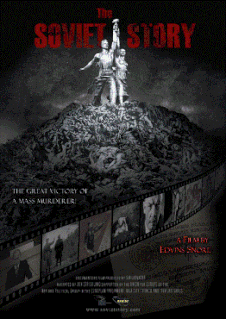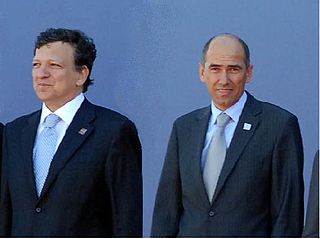Related Research Articles

The Molotov–Ribbentrop Pact was a non-aggression pact between Nazi Germany and the Soviet Union that enabled those two powers to partition Poland between them. The pact was signed in Moscow on 23 August 1939 by German Foreign Minister Joachim von Ribbentrop and Soviet Foreign Minister Vyacheslav Molotov and was officially known as the Treaty of Non-Aggression between Germany and the Union of Soviet Socialist Republics.

Tatjana Ždanoka is a Latvian politician and a Member of the European Parliament. She is co-chairwoman of the Latvian Russian Union and sits with the European Greens–European Free Alliance group.
Neo-Stalinism is the promotion of positive views of Joseph Stalin's role in history, the partial re-establishing of Stalin's policies on certain issues and nostalgia for the Stalin period. Neo-Stalinism overlaps significantly with neo-Sovietism and Soviet nostalgia. Various definitions of the term have been given over the years.
In the resolution 1481/2006 of the Council of Europe Parliamentary Assembly (PACE) issued on 25 January 2006 during its winter session, the Council of Europe "strongly condemns crimes of totalitarian communist regimes".

Communist propaganda in the Soviet Union was based on the Marxist–Leninist ideology to promote the Communist Party line. Propaganda was one of the many ways the Soviet Union tried to control its citizens. In the Stalin era, it penetrated even social and natural sciences giving rise to the pseudo-scientific theory of Lysenkoism, whereas fields of real knowledge, as genetics, cybernetics and sociology were condemned and forbidden as "bourgeois pseudoscience".

The Soviet Story is a 2008 documentary film about Soviet communism and Soviet–German collaboration before 1941 written and directed by Edvīns Šnore and sponsored by the Union for Europe of the Nations group in the European Parliament.

Black Ribbon Day, officially known in the European Union as the European Day of Remembrance for Victims of Stalinism and Nazism, is an international day of remembrance for victims of totalitarian regimes, specifically Stalinist, communist, Nazi and fascist regimes. Formally recognised by the European Union, the Organization for Security and Co-operation in Europe and a number of other countries, it is observed on 23 August and symbolizes the rejection of "extremism, intolerance and oppression". The purpose of the Day of Remembrance is to preserve the memory of the victims of mass deportations and exterminations, while promoting democratic values with the aim to reinforce peace and stability in Europe. It is one of the two official remembrance days or observances of the European Union, alongside Europe Day. Under the name Black Ribbon Day it is also an official remembrance day of Canada, the United States and other countries. The European Union has used both names alongside each other.

The Prague Declaration on European Conscience and Communism was a declaration which was initiated by the Czech government and signed on 3 June 2008 by prominent European politicians, former political prisoners and historians, among them former Czech President Václav Havel and future German President Joachim Gauck, calling for "Europe-wide condemnation of, and education about, the crimes of communism." Much of the content of the declaration reproduced demands formulated by the European People's Party in 2004, and draws heavily on totalitarianism theory.
The Declaration on Crimes of Communism is a declaration signed on 25 February 2010 by several prominent European politicians, former political prisoners, human rights advocates and historians, which calls for the condemnation of communism.

Crimes Committed by Totalitarian Regimes are reports and proceedings of the European public hearing organised by the Slovenian Presidency of the Council of the European Union and the European Commission. The Hearing was organised in response to the request made by the Justice and Home Affairs Council of the European Union on 19 April 2007.
The Vilnius Declaration was a declaration adopted by the Organization for Security and Co-operation in Europe (OSCE) during the 18th annual session of its parliamentary assembly, that took place in Vilnius from 29 June to 3 July 2009.

A number of authors have carried out comparisons of Nazism and Stalinism in which they have considered the similarities and differences of the two ideologies and political systems, what relationship existed between the two regimes, and why both of them came to prominence at the same time. During the 20th century, the comparison of Nazism and Stalinism was made on the topics of totalitarianism, ideology, and personality cult. Both regimes were seen in contrast to the liberal West, with an emphasis on the similarities between the two.
The Platform of European Memory and Conscience is an educational project of the European Union bringing together government institutions and NGOs from EU countries active in research, documentation, awareness raising and education about the crimes of totalitarian regimes. Its membership includes 62 government agencies and NGOs from 20 EU member states, non-EU European countries, as well as from the United States, such as the Institute of National Remembrance, the Berlin-Hohenschönhausen Memorial, the Stasi Records Agency and the Victims of Communism Memorial Foundation. The platform has offices in Prague and Brussels (formerly). The President of the platform is Łukasz Kamiński, former President of the Polish Institute of National Remembrance.
The European Public Hearing on European Conscience and Crimes of Totalitarian Communism: 20 Years After was a European public hearing organised by the Czech Presidency of the European Union in the European Parliament on 18 March 2009. The hearing was described by the Presidency as "the third step towards the establishment of a European Platform of Memory and Conscience to support the activities of institutions engaged in reconciling with totalitarian regimes in Europe."
The European Parliament resolution of 2 April 2009 on European conscience and totalitarianism was a resolution of the European Parliament adopted on 2 April 2009 by a vote of 533-44 with 33 abstentions, in which the European Parliament condemned totalitarian crimes and called for the recognition of "Communism, Nazism and fascism as a shared legacy" and "an honest and thorough debate on all the totalitarian crimes of the past century." The resolution also called for several measures to strengthen public awareness of totalitarian crimes.
The Seventy Years Declaration was a declaration initiated by academics Dovid Katz and Danny Ben-Moshe and released on 20 January 2012 to protest against the policies of several European states and European Union bodies on the evaluation, remembrance and prosecution of crimes committed under communist dictatorships in Europe, specifically policies of many European countries and the EU treating the Nazi and Stalinist regimes in Eastern and Central Europe as equally criminal. Presented as a response to the Prague Declaration on European Conscience and Communism initiated by the Czech government in 2008 to condemn communism as totalitarian and criminal, it explicitly rejects the idea that the regimes of Joseph Stalin and Adolf Hitler are morally equivalent, i.e. the totalitarianism theory that was popularized by academics such as Hannah Arendt, Carl Friedrich and Zbigniew Brzezinski and became dominant in Western political discourse during the Cold War, and that has gained new momentum in many new EU member states following the fall of communism, resulting in international resolutions, establishment of research institutes and museums, and a day of remembrance. The declaration also states that communist regimes did not commit genocides, citing the 1948 Genocide Convention which restricts genocide to mass killings related to ethnicity, race, nationality, or religion. The declaration advances the position that the Holocaust was unique, a subject of some debate. The declaration was signed by 70, mostly left-wing, parliamentarians from Europe. It was released on the 70th anniversary of the Wannsee Conference in Berlin.

Decommunization in Ukraine started after the collapse of the Soviet Union. It was formalized in April 2015, when the Ukrainian government approved laws that outlawed communist symbols.

Bans on communist symbols were introduced or suggested in a number of countries as part of their policies of decommunisation.
A memory law is a legal provision governing the interpretation of a historical event and showcases the legislator's or judicial preference for a certain narrative about the past. In the process, competing interpretations may be downplayed, sidelined, or even prohibited.
Law Against Rehabilitation of Nazism is a Russian memory law of 2014. It also known as Yarovaya Law, after a Russian politician who was instrumental in passing it.
References
- 1 2 3 "European Parliament resolution of 19 September 2019 on the importance of European remembrance for the future of Europe". European Parliament. 2019-09-19.
- ↑ "European Parliament ties denial of totalitarian crimes to information wars". Eesti Rahvusringhääling. 2019-09-27.
- ↑ "EP calls to counter Russia's attempts to whitewash Soviet crimes and rewrite history". LRT. 2019-09-19.
- ↑ "MEPs condemn 1939 Soviet-German pact that aimed to carve up Poland, Europe". Polskie Radio. 2019-09-19.
- ↑ "EU Day of Remembrance for the victims of totalitarian and authoritarian regimes". The Brussels Times . 2020-08-23.
- ↑ Dujisin, Zoltan (2020). "A history of post-communist remembrance: from memory politics to the emergence of a field of anticommunism". Theory and Society. doi:10.1007/s11186-020-09401-5.
- ↑ "EU, Russia row over WWII, with Poles and Czechs on front lines". Radio Prague. 2020-01-22.
- ↑ "Russia Slams EU Resolution Stating Nazi-Soviet Pact 'Paved Way' For WWII". Radio Free Europe/Radio Liberty. 2019-08-21.
- ↑ "Vladimir Putin condemns EU stance on Nazi-Soviet WWII pact". Deutsche Welle. 2019-12-11.
- ↑ "Why Vladimir Putin is angry at Poland". BBC. 2019-12-26.
- ↑ "Russia is once again rewriting history". The Financial Times . 2020-01-05.
- ↑ "Vladimir Putin Wants to Rewrite the History of World War II". Foreign Policy . 2020-01-21.
- ↑ "Polish PM furious at Putin rewriting history of second world war". The Guardian . 2019-12-30.
- ↑ "US accuses Russia of "falsifying WWII history"". Atlantic Council. 2020-08-07.
| This article about the European Union is a stub. You can help Wikipedia by expanding it. |